People driving cars on what are supposed to be carfree paths for bicycling and walking has become a major problem in Portland in recent years. As tents and other temporary housing structures have sprung up on public right-of-ways adjacent to multi-use paths, it has become increasingly common for people who live in the camps to drive cars right up to their front doors. The presence of cars is unexpected for path users and can obstruct people from safely using these areas.
To deal with this tricky issue, government agencies erect barricades to keep the cars out, but those barricades often end up compromising access for law-abiding users of the paths as well. We saw this happen on the Columbia Slough path in 2022 when Portland Parks & Recreation erected large cement Jersey barriers to keep drivers off the path.
Today I confirmed yet another path where public access has been restricted due to concerns about campers and cars: The “Going to the River” path on Swan Island that opened in 2006 and provides a connection to the Willamette Riverfront via N Going Street and Port Center Way.
After coming across a photo shared by @Intersection911 on X earlier today, I contacted Portland Parks & Recreation to inquire about the situation. The photo showed what looked like a complete blockage to the path entrance from Port Center Way just south of Going Street/Channel Ave. This is the path folks take to access Lindbergh’s Beach. It’s a connection to about a mile of continuous, carfree, paved riverfront path between the Union Station Railyards and a boat ramp at the northern end of the Daimler Trucks North America campus. I recommended this route to families in a 2020 post about riding on Swan Island.
Today I learned the Portland Bureau of Environmental Services has jurisdiction over this path. BES Public Information Officer Diane Dulken confirmed that they erected these concrete barriers to prevent automobile access to the path about nine months ago. When they installed the barriers they left room an opening for other users like bike riders, walkers, wheelchair users, and so on. “But an unknown person or persons further blocked the path, as you are pointing out in the photo,” Dulken shared with BikePortland today.
Dulken said BES has no plans to remove the barrier because it is “working to protect the public from illicit driving on the river pathway.” Here’s more from Dulken:
“Safety at this site continues to be our top priority. There is a considerable amount of unsanctioned camping in the area and the site has had a history of people camping along the pathway and beach, and driving illegally and dangerously along the pathway, posing an unacceptable risk to people walking, rolling, and biking. Since the barriers have been placed, that driving has stopped.”
Dulken said the public can access the river and path via another entry point about one-tenth of a mile away. The path is to the northwest of the location in the photo and is located about 400-feet west of Port Center Way along the eastern edge of the Daimler Truck First Gear Academy school (see map graphic above). BES says they don’t own that path and I’m still trying to find out who does. I’ll update this post with that information soon.




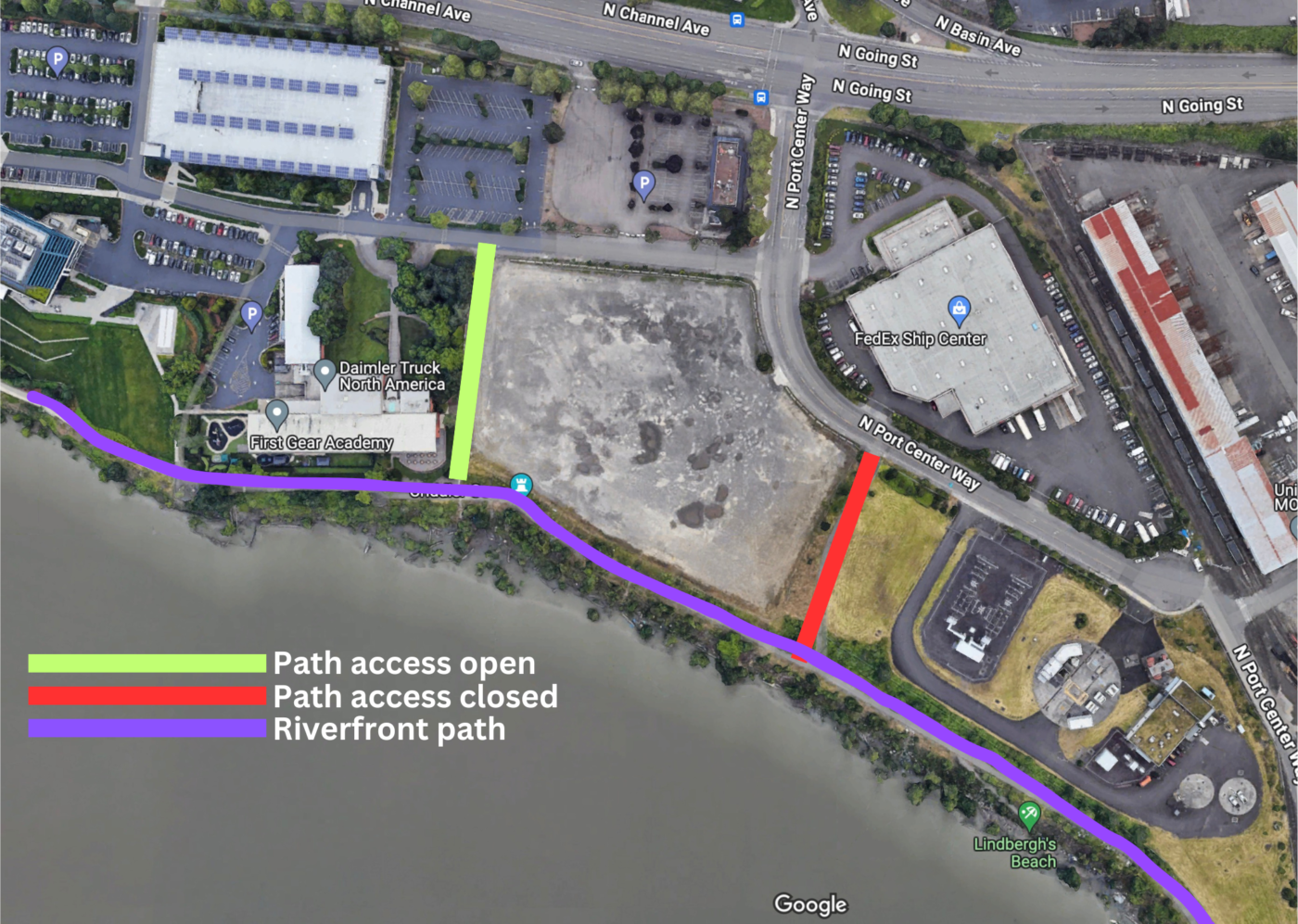
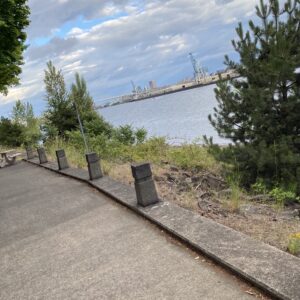
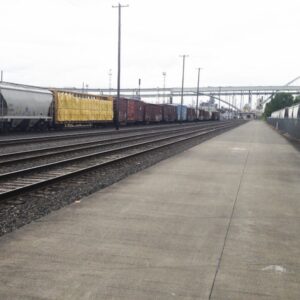
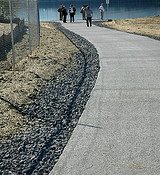
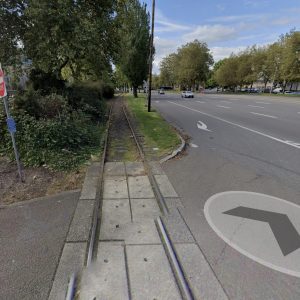
Thanks for reading.
BikePortland has served this community with independent community journalism since 2005. We rely on subscriptions from readers like you to survive. Your financial support is vital in keeping this valuable resource alive and well.
Please subscribe today to strengthen and expand our work.
I bicycled down to Lindbergh’s Beach last week, and also noticed the barricades. I pushed my bicycle through them without much trouble, but the boulders would block entry to people trying to haul building supplies down to the beach on trailers, which I assume is the intention.
As noted in the article, the middle access point to the beach is still open to all users, fully ADA compliant.
The more noteworthy observation was that there were only two or three houseless camps on the beach. And almost no garbage anywhere. I would have felt comfortable going down to the beach for a picnic, an afternoon sunbath, or a family party.
This was *not* the case the previous few times I visited. From visits in fall 2021 until spring 2023 there were about 50 encampments and structures on the beach. And a lot of household-type garbage along the waterline, as if the people living on the beach just tossed their garbage into the water.
So, if you like beaches, rivers, swimming, picnics, sunbathing, sunsets, Fremont-Bridge views, etc. this is a good time to take advantage of the beach being a comfortable, beautiful, remote public space.
Also, not noted in this article, the parking lot at the north end of this segment of the Willamette Greenway is closed, and fenced off.
https://maps.app.goo.gl/k2EcXMi6K3yNigT86
So there is no public parking lot available for visiting the beach. I usually park in the Subway parking lot if I go by car, there is probably public parking on some of the surface streets, I’m not sure which one. But it has always been a beach much more accessible by bicycle than by car, so it’s not much different than before, even with the parking lot at the north entrance closed.
Ted Buehler
One question is whether BDS can legally close it. I looked quickly on portlandmaps.com but land use case documents aren’t available the way building permit documents are, so couldn’t tell.
The question is whether there are land use conditions of approval or something similar that required that path. If so, the owner can’t just close it because they want to–although in this case, with access nearby, and the vehicle problem solved (?) it may not really matter practically.
But Ted said he was able to get his bike past the barriers easily. So no problemo!
I do not think the barriers on the Columbia Slough path or these barriers are anywhere near as bad as the situation they are preventing. I visit both location frequently, and the barriers never excluded bikes, they just were not placed in a thoughtful or safe way. The people taking over these public spaces, however, were creating unsafe conditions for biking by leaving dangerous and harmful material around and by being actively hostile and possessive of a public resource. I realize you are trying to be sensitive with your language and be respectful of people experiencing homelessness, but I do not think your characterization is accurate. Many of the people in the camps on the path/beach on the south end of Swan Island were openly aggressive to people biking or walking near them, in addition to them damaging the path, the trees and shrubs and the river. It is too bad that some one added boulders and further blocked the access here, and I hope this access is restored as long as cars are excluded. I would rather lose an access point than lose the whole resource.
Thanks maxD. Fair points. I’m just very sensitive to city agencies dropping huge barricades at key path entrances. Yes Parks has gotten better and I realize it’s an evolving issue and these agencies are doing the best they can to deal with a very tricky problem. My sentences might not have come off right in that paragraph, but I agree with you that having folks taking over these public paths with their hazards and driving is definitely a much bigger problem then having to go around a barricade. I’ll try to edit it a bit to better reflect what I believe. Thanks,
The barriers weren’t good enough to prevent me from getting run off the Slough trail heading eastbound toward Vancouver while a truck raced west. We need better barriers, even if that means collateral damage.
Unfortunately, the state of our city, even country, is going to leave someone out. Left open, camps will take over and it’s just as unrealistic to arrest our way out of that than it is to fix the capitalist system that creates campers. I wish that small groups of people at both ends of the economic spectrum weren’t taking so much from the general public.
Yes, drugs and alcohol are just so capitalist.
Those socialist, communist, dictatorship countries never ever have issues with drugs and alcohol.
As a person who actually lived in a communist dictatorship, one of the things it unambiguously provided was housing for everyone*.
*including of “free housing” for dissidents and forced “free housing” in large cities for romani
Once again concepts such as personal responsibility and honoring social contracts are considered taboo in Portland Oregon.
I guarantee most people sleeping on the street would have no idea what this politically theory means.
*political
Apparently I don’t either…
Yes, a homeless person living in a tent on a beach polluted with industrial waste has the same social responsibility as a millionaire living in a mansion in the West Hills. I am very smart.
There are plenty of millionaires in Portland. Choose your examples from the east side please. I get tired of the cliches.
The highest median house prices by neighborhood are in Healy Heights and Arlington Heights, so this is one cliché that appears to be true.
https://www.koin.com/news/neighborhoods-in-portland-oregon-with-the-most-expensive-home-sales/
Buddy, if you think people at the very bottom of the economic ladder are taking as much as the people at the top I’ve got a tunnel in Las Vegas to sell you.
Seriously; I had to call the cops last weekend because Jeff Bezos was blocking the Columbia Slough trail with his yacht, and I think he was pushing a passed out Bill Gates around in a shopping cart.
I assume this is a joke of some kind, I just don’t see the humor in it.
Yes. It was a play on conversation’s abrupt pivot from people complaining about campers to complaining about rich people, and I was trying to think of a way in which rich people were impacting public paths in the same way campers are. Jeff Bezos obviously isn’t going to set up a tent on the Columbia Slough trail, so I thought the next best thing was him parking his yacht on the trail, which struck me as a slightly humorous image. The imagery of him and Bill Gates came from a bike ride along the Springwater where I saw a similar scene play out, and I though well illustrated the problems with our bike paths while using the absurdity of that scene involving Gates and Bezos (again referencing the conversational turn) being potentially funny.
I’m sorry you didn’t enjoy the humor.
When billionaires can unilaterally decide to close the trail to a public beach, not to mention hoarding trillions in untaxed wealth and trying to overthrow democracy, all while profiteering on a deadly pandemic, to flippantly equate a homeless camp with Jeff Bezos’s yacht is a little tone deaf IMO.
Well said, maxD. The worst situation I experienced was on the Marine Drive path, where I descended toward the woods and found myself smack in the middle of a homeless camp. The path was physically blocked by cars and campers – I had no choice but to back out and turn around. Now that was a TOTAL trail takeover. I’ve not been back to see if it has improved.
Ditto, contending with motor vehicle’s on a bike path is never pleasent…or campers or tweakers or etc…and I love Jersey barriers as much as the next guy… but why for the love of frogs can’t the bureau who places these dead center on a bike path not slap a few hi-viz/ reflectors/ orange spray paint etc on the barriers for the sake of a potentially unsuspecting cyclist traveling down them…I’ve almost hit the same Marine drive barrier twice now…And I KNOW the thing is there.
I wasted plenty of time emailing PPR to no avail. Pretty sure Mark Ross is stealing from the public with his remarks as to why the parks bureau has gone the way of ODOT in our public spaces. The city literally has no answer to Houselessness. It’s truly sad. Boulders, logs, and other defensive structures aren’t the answer. Housing sure is and sadly the county is unable to spend our money to help folks. Really makes you struggle to contemplate who to vote for since few of them can get their priorities straight. Maybe one day we can see progress without Jessica Vega Pederson’s ego and Ted’s mad love for developers.
They’re *an* answer to the question: How do we stop people from taking public spaces for their own use?
See maxD’s excellent post above.
Boulders, logs, and other defensive structures aren’t the answer.
Are there green spaces in the city that we should strongly discourage camping and car/rv/trash dumping in?
Doug —
I see Mark Ross is with Portland Parks and Rec.
https://bikeportland.org/tag/mark-ross
What was the subject matter of your emails with him?
Also, given that the city has no answer to houselessness, in what ways do you object to using logs or boulders to prevent, in MaxD’s phrase, “The people taking over these public spaces, however, were creating unsafe conditions for biking by leaving dangerous and harmful material around and by being actively hostile and possessive of a public resource.”
I think the introduction of logs is a very good idea. For several years there were two houseless camps along the N Greeley Access to Swan Island, in Madrona City Park. About a year ago someone (Parks and Recreation?) put a bunch of tree trunks in the area after one of the times the camp was removed.
This are the locations.
https://maps.app.goo.gl/xLmw4g1NJjmHPwNa9
https://maps.app.goo.gl/v9jZPmQVQjJDABZc9
The photo is from Oct 2021. I think this location was more-or-less continuously occupied with a camp and things like stolen car scrapping until about spring, 2023, when logs were installed.
Now the campers have moved to another place (likely with a smaller footprint and fewer activities like stolen cars being scrapped on-site). And the soil will actually be rehabilitated over the next 20 years as the logs decay. It’s a win for foliage, wildlife and soil in the city’s green spaces.
Nothing in the Martin vs. Boise 2018 court ruling exempts the city from enforcing laws about car theft, sewage disposal, vegetation destruction in green spaces, etc. It only dictates that everyone has the right to rest, sleep, pee and poop.
With regard to access to multiuse paths with trailers, in the past (2008 – 2019) I would regularly submit a maintenance request if concrete barriers left a rideable area with a width less than 5′ on multiuse paths (per the Oregon Highway Design Manual). I did this many times, with success. I have pulled my 40″ wide cargo trailer on many paths in Portland. And been peeved when I had to stop and tilt it sideways to get through a substandard gap along a trail.
Since the 2018 Martin vs. Boise ruling, and the City of Portland’s liberal interpretation of what public health and other laws it restricted the city from enforcing with regard to houseless camps, I have stopped submitting maintenance requests for maintenance of minimum trail width. For the time being, I am very much fine with barriers like the one in the photo that prevent bike trailers from getting through, if it means that that paths will remain more safe and open in camp areas for commute and recreational uses.
Are these the types of issues you have submitted emails about? Or something else?
Ted Buehler
Sweeps Save Access Points.
We wouldn’t have this problem if we had a robust system for sweeping these camps and cleaning up the environmental disasters they leave behind.
I recall this barricade went up in about November 2023 (I don’t think the quoted 9 months ago is quite accurate but it doesn’t really matter) … I was training for a half marathon in December at the time and that was my Sunday jogging route. One Sunday towards the end of my training, I suddenly started needing to do a bit of a parkour move to get over this barricade. It is a particularly frustrating barricade because they didn’t provide any way for a pedestrian or bicyclist to get around it. As you can see from the photo, it looks like the barricade is designed to block everyone, not just cars.